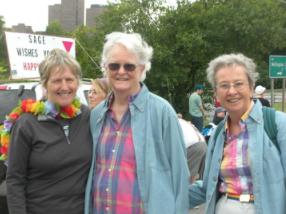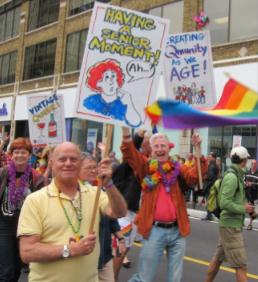
"If you're an older person, the bar scene isn't necessarily for you," says OSPN volunteer John Richardson.
As the first “out” generation in Ottawa begins to reach retirement age, there is an increasingly urgent need to build community and develop resources for older members of the city’s gay community.
This is why, in 2008, the Ottawa Senior Pride Network (OSPN) was created. The initiative, spearheaded by Donna Munro and Cathy Collett of the Centretown Community Health Centre (CCHC), is about addressing isolation and improving gay cultural competency in local groups and organizations that serve gay seniors.
Four years later, OSPN is a citywide network of service providers, queer community organizations and individual members of the queer community who are 50 or older. The group now has more than 50 active volunteers.
Among other things, OSPN looks at the care that gay seniors receive — or don’t receive — and teaches seniors and their caregivers about queer visibility and acceptance.
“People don’t need to go back into the closet in their senior years and die like that,” says Marie Robertson, 60, who has been an OSPN volunteer since 2008 and, in 2011, became the group’s community development coordinator. “The work that we need to do in residential care facilities and services for seniors, we can’t wait until we’re 70. We need to change things now.”
The first step in improving end-of-life care for Ottawa’s queer population lies in expanding an initiative of the Good Companions seniors’ centre called Seniors Helping Seniors. As of this month, queer seniors now have more options for volunteer care and support.
“Now people can call and say, ‘I want a friendly visitor, and I’d like a lesbian please,’” Robertson says. “Some people don’t ask for help . . . because there have been some bad things happen where visitors weren’t trained and were freaked out by the fact that, say, an old guy was a gay man.”
Eleven OSPN volunteers have been trained, to date, and four are already volunteering, doing daily assurance phone calls, visiting with isolated gay seniors, acting as helpers in people’s homes or supporting them in their day-to-day activities.
Countless other OSPN initiatives have also come to fruition in the last two years, including a twice-monthly bar night called Seniors’ Night Out, self-defence classes, a series of educational workshops and a new event called the Vintage Queers Dance, taking place at, and raising funds for, the Good Companions.
“If you’re an older person, the bar scene isn’t necessarily for you — you really feel out of place, says John Richardson, a volunteer with OSPN and a frequenter of Seniors’ Night Out events. “You might see your children there, or maybe even your grandchildren. This is specifically a senior-oriented event with music of the ’60s, ’70s and ’80s. It will hopefully bring people out who may have been a bit isolated or haven’t been out to bars or other establishments for a while.”
These days, most of Senior Pride’s programming takes place at the Good Companions seniors’ centre – one of OSPN’s main organizing partners in the city and an enthusiastic supporter of the network’s goals.
The work of OSPN volunteers is really coming home to roost: they were the ones who initiated trainings at the Good Companions to improve the organization’s queer cultural competency, and now it’s a place where gay seniors are starting to feel comfortable coming out — and being out.
“This is the next frontier, and we want to make sure everything has changed before we get there,” says Robertson. “We just did a massive mail-out to a whole bunch of seniors’ services and homes in the city, and we’re starting to get requests for speakers and meetings.”
For their part, Good Companions has been receptive to queer programming ideas and even has a pride flag on display in the reception area to ensure everyone knows the centre is intended to be a queer-positive space.
Some other, unexpected benefits are also coming out of the OSPN project.
“In the younger people’s community in the city, I’ve seen a lot more mixing of men and women, and I think that’s fantastic,” Robertson says. “The seniors here haven’t [done that] historically, and that’s one of the things I love about Senior Pride — to have a mixed dance, for us, is fantastic. And this gives us an opportunity to dance to the music that we want.
“I plan to be same when I’m 80 as I am now, which is high-energy, lots of ideas, requiring lots of stimulation, and I want to be dancing.”
Ottawa Senior Pride Network’s upcoming events:
Vintage Queers Dance
Sat, May 12 at 8pm
Good Companions Centre
670 Albert St
$20 advance, $25 door
Seniors’ Night Out
First and third Wednesday of the month at 7:30pm
Burgers on Main
343 Somerset St W, second floor
Steppin’ Out Sisters
Line dancing for lesbians aged 50+
Wednesdays at 7pm
Good Companions
670 Albert St
$50 for 10 weeks or $7 per drop-in
Rainbow Coffee Drop–in
First Wednesday of the month at 10am
Community kitchen room
Hartman’s
296 Bank St
For more info, go to ospn-rfao.ca.

 Why you can trust Xtra
Why you can trust Xtra


